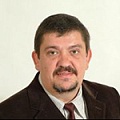As of 30.01.2020
Name of the project: New materials and technologies of solid state fuel cells, ceramic membranes, and high temperature gas electrolysers
Strategy for Scientific and Technological Development Priority Level: б
Research directions: New oxide and composite materials, technologies of new electrochemical devices of application in the power industry, fundamental research in the domain of high temperature electrochemistry and solid state physical chemistry
Project objective: Development of new materials with high mixed ion-electron conductivity and other functional qualities necessary for usage as electrodes of medium temperature solid oxide fuel cells, solid oxide electrolysers and ceramic membranes, as well as state-of-the-art technologies for producing highly efficient electrochemical devices adaptable to manufacturing conditions of industrial partners
|
Hosting organization
|
Field of studies
|
City
|
Invited researcher
|
Time span of the project
|
|---|---|---|---|---|
|
New Approaches to Solving the Microplastics Problem as a Potential Threat to Humans and the Environment
Yaroslav-the-Wise Novgorod State University - (NovSU) |
Chemistry |
Veliky Novgorod |
Kenny Jose Maria
Italy |
2024-2028 |
|
Laboratory for Redox-active Molecular Systems
Kazan Scientific Center of Russian Academy of Sciences - (FRC KazSC of RAS) |
Chemistry |
Kazan |
Alabugin Igor Vladimirovich
Russia, USA |
2022-2024 |
|
Spin Hyperpolarisation Laboratory
International Tomography Center Siberian Branch of RAS - (ITC) |
Chemistry |
Novosibirsk |
Bodenhausen Geoffrey
France, Netherlands |
2021-2023 |




